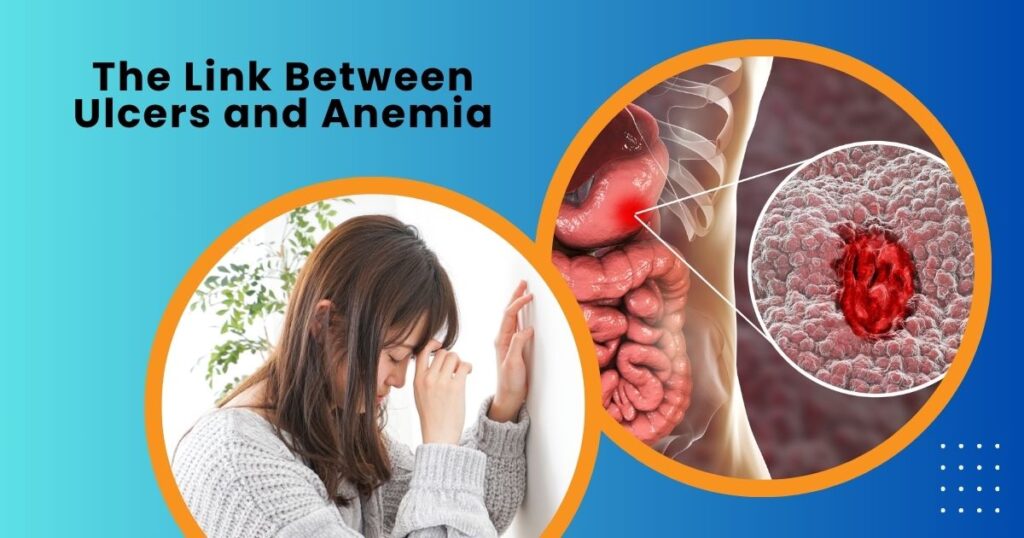Anemia is a disorder that affects millions of individuals worldwide and it happens due to a lack of healthy red blood cells. The impact of ulcers, especially those in the stomach or intestines, is one of the many reasons for anemia. This reason is often overlooked. On the lining of the digestive tract, ulcers are sores that can form and cause internal bleeding. This bleeding if it is continuous and is left unchecked, can cause a substantial iron loss, resulting in anemia. We’ll look at the signs to be aware if there is ulcer and anemia in an individual, and also the available treatment options in this blog.
Understanding Ulcers
Ulcers are open sores that occur on the inner lining of the stomach, upper small intestine, or esophagus. These lesions frequently result due to the following reasons:
- infections – Infections in the stomach lining that can be damaged by Helicobacter pylori (H. pylori) bacteria.
- Drugs- The stomach lining may become irritated with prolonged use of nonsteroidal anti-inflammatory medicines (NSAIDs), such as aspirin or ibuprofen.
- Lifestyle Factors – Smoking, excessive alcohol use, and high levels of stress can all raise the chances of getting an ulcer.
When the protective lining of the digestive tract is damaged, stomach acid can erode the lining tissue, resulting in painful sores. These ulcers have the potential to bleed sometimes. If ignored for a long period of time and if they develop into a persistent source of blood loss then it can lead to anemia.
Why Persistent Bleeding Ulcers Lead to Anemia
-
Blood Loss from Bleeding Ulcers
Internal bleeding is one of the major ways that ulcers cause anemia. Internal bleeding in the gastrointestinal system can occur when an ulcer erodes into a blood vessel. This bleeding may occur suddenly and severely, or it may occur slowly and continuously, resulting in chronic blood loss.
- Iron Deficiency Anemia: The body’s iron reserves are depleted by long-term blood loss due to an ulcer. Hemoglobin, the protein found in red blood cells that delivers oxygen, requires iron to function properly. Iron deficiency anemia is caused by the body producing fewer healthy red blood cells when there is less iron available.
- Acute Blood Loss Anemia: Acute blood loss anemia can occur when a person experiences severe bleeding from an ulcer and loses a significant volume of blood fast. Fatigue, lightheadedness, and an accelerated heart rate are some of the symptoms that make this kind of anemia more obvious.
-
Inadequate Absorption of Iron
Some patients with ulcers may not only lose blood but also have trouble absorbing iron. Iron and other vital elements may be further depleted from the body if ulcers form in the top portion of the small intestine and obstruct the absorption of nutrients.
Signs and Symptoms to Look Out for Ulcer and Anemia
Anemia and ulcers both have their own unique set of symptoms. Early diagnosis and treatment may result from recognizing the symptoms.
-
Some key symptoms of Ulcers:
- Burning or gnawing pain in the stomach, often between meals or at night
- Nausea or vomiting
- Bloating and burping
- Blood in vomit or stools, which may appear dark or tarry
-
Some key Symptoms of Anemia:
- Fatigue and weakness
- Pale skin and brittle nails
- Shortness of breath
- Dizziness or lightheadedness
- Cold hands and feet
If you experience a combination of these signs and symptoms like pale skin and stomach discomfort coupled with exhaustion, it is possible that you have an ulcer that is causing anemia.
Diagnosing and Treating Ulcer-Related Anemia
-
Medical Diagnosis
Diagnosing ulcer-related anemia involves a combination of these factors:
- Blood Tests: To check iron levels, hemoglobin, and other anemia-related markers.
- Endoscopy: A diagnostic technique in which the stomach and intestines are seen by the surgeon for the presence of any ulcers. This is done by inserting a flexible tube equipped with a camera down the throat.
- Stool Tests: To look for concealed blood in the stool, which might suggest internal bleeding.
-
Treatment Options
Treating anemia caused by ulcers requires addressing both the anemia and the underlying ulcer.
- For Ulcers:
- Medications: Proton pump inhibitors (PPIs) and H2 blockers are some of the commonly prescribed medications aimed at reducing stomach acid and promoting healing.
- Antibiotics: If H. pylori infection is the cause, antibiotics will be prescribed to eradicate the bacteria.
- Lifestyle Changes: Reducing stress, avoiding alcohol, and quitting to smoke can help prevent ulcer recurrence.
- For Anemia:
- Iron Supplements: To raise iron levels again, doctors may advise taking iron supplements. Blood transfusions or intravenous iron may be required in extreme circumstances where the hemoglobin level dips below 8gm.
- Dietary Adjustments: Consuming foods high in iron, such as lean meats, green leafy vegetables, greens, and cereals with added iron, will also aid in the healing process.
The connection between anemia and ulcers emphasizes how critical gastrointestinal health is to general health. Iron levels can be greatly impacted by bleeding ulcers and the associated chronic blood loss. This chronic blood loss results in anemia and the symptoms that go along with it. Early action is critical if ulcers and anemia are recognized for their signs and symptoms. Both illnesses may be effectively managed and quality of life improved by individuals with the right treatment protocol combined with lifestyle modifications. Speak with your doctor if you think your anemia may be caused by an ulcer so you can get the right assessment and treatment you need.
